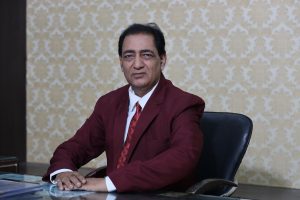The M.Tech. in Structural Engineering program is designed to equip students with advanced knowledge and skills in the field of civil engineering, focusing on the analysis, design, and construction of structures. This program aims to provide an in-depth understanding of structural behavior, material properties, and modern construction technologies. Students will learn about the latest innovations in earthquake-resistant design, sustainable construction materials, and high-rise building techniques. The curriculum integrates theoretical concepts with practical applications through laboratory experiments, industry projects, and research opportunities. Graduates from this program are well-prepared to take up leadership roles in the construction industry, research organizations, and academia.
- Course Overview
- Head of Department
- PEO
- Course Snapshot
- Course Content
- Facilities
- Career Options
- Faculty
- Activity
Course Overview
The M.Tech. in Structural Engineering program offers an interdisciplinary approach that blends civil engineering principles with computational tools and innovative technologies. The program focuses on subjects like Advanced Structural Analysis, Finite Element Methods, Earthquake Engineering, and Bridge Design. Students will gain hands-on experience with industry-standard software like STAAD.Pro, ETABS, and ANSYS. The program also includes seminars, case studies, and industrial visits to bridge the gap between theoretical learning and real-world applications. With increasing demands for skilled structural engineers worldwide, this program ensures that students are well-prepared to contribute to modern infrastructure development.
 Dr. Sanjay Kumar Verma, the Head of the Department of Civil Engineering, is an esteemed academician and researcher in the field of Structural Engineering. With a Ph.D. in Civil Engineering and a Master’s in Structural Engineering, he brings vast expertise in designing and analyzing complex structures. Dr. Verma has over 15 years of teaching and research experience and has contributed significantly to the field through research publications, consultancy projects, and industry collaborations. His vision is to develop the department into a center of excellence, emphasizing research-driven education, industry partnerships, and student skill enhancement to prepare them for leadership roles in the engineering sector.
Dr. Sanjay Kumar Verma, the Head of the Department of Civil Engineering, is an esteemed academician and researcher in the field of Structural Engineering. With a Ph.D. in Civil Engineering and a Master’s in Structural Engineering, he brings vast expertise in designing and analyzing complex structures. Dr. Verma has over 15 years of teaching and research experience and has contributed significantly to the field through research publications, consultancy projects, and industry collaborations. His vision is to develop the department into a center of excellence, emphasizing research-driven education, industry partnerships, and student skill enhancement to prepare them for leadership roles in the engineering sector.
Program Educational Objectives (PEO)
- Core Knowledge – Develop a strong foundation in structural engineering principles to solve real-world problems.
- Research & Innovation – Encourage students to engage in innovative research and contribute to the field of sustainable and earthquake-resistant structures.
- Industry Readiness – Equip students with the technical and managerial skills required for successful careers in engineering consultancy, construction firms, and academia.
- Ethical Engineering Practices – Instill professional ethics, social responsibility, and environmental awareness in students to contribute positively to society.
- Lifelong Learning – Promote continuous learning through participation in professional organizations, certifications, and further research.
Course Snapshot
- Duration: 2 Years (4 Semesters)
- Eligibility: Bachelor’s degree in Civil Engineering with minimum 50% (45% for OBC/SC/ST)
- Specialization: Structural Engineering
- Industry Exposure: Internships, industrial visits, and live projects
- Software Training: STAAD.Pro, ETABS, ANSYS, AutoCAD
- Research Focus: Earthquake Engineering, Smart Materials, Sustainable Structures
Course Content
The M.Tech. Structural Engineering curriculum is designed to provide in-depth theoretical and practical knowledge. Key subjects include:
- Advanced Structural Analysis
- Finite Element Method
- Design of Reinforced Concrete & Steel Structures
- Earthquake-Resistant Design
- Prestressed Concrete Structures
- Construction Project Management
- Structural Dynamics
- Wind and Seismic Analysis
- Foundation Engineering
- Structural Health Monitoring
The program also includes a research dissertation, industrial training, and elective courses tailored to industry requirements.
Facilities
Our department provides state-of-the-art facilities for students, including:
- Advanced Structural Engineering Lab with testing equipment for materials and structures.
- Computer-Aided Design (CAD) Lab equipped with software like STAAD.Pro, ETABS, and ANSYS.
- Earthquake Simulation Lab to study seismic effects on structures.
- Concrete and Material Testing Lab for evaluating construction materials.
- Industry Collaboration Center for live projects, guest lectures, and internships.
Career Options
Graduates of M.Tech. in Structural Engineering have a wide range of career opportunities, including:
- Structural Engineer – Designing high-rise buildings, bridges, tunnels, and offshore structures.
- Construction Manager – Overseeing construction projects for safety, quality, and efficiency.
- Researcher/Academician – Engaging in advanced research or teaching at universities.
- Consultant – Working with architectural and engineering firms for design solutions.
- Government Sector Jobs – Opportunities in PWD, NHAI, Railways, and Urban Planning.
- Entrepreneurship – Starting structural consultancy or construction business.
With growing infrastructure demands, skilled structural engineers are in high demand across the globe.
Faculty
The Department of Structural Engineering boasts a team of highly experienced faculty members with expertise in various domains such as Structural Analysis, Earthquake Engineering, Smart Materials, and Bridge Design. Faculty members hold Ph.D., M.Tech., and industry certifications, ensuring students receive the best academic and practical guidance. Regular faculty training programs and industry collaborations ensure they stay updated with the latest advancements.
Activities
The department actively organizes events and activities to enhance student learning and industry exposure:
- Workshops & Seminars on earthquake engineering, sustainable structures, and software training.
- Guest Lectures by industry experts from leading engineering firms and research organizations.
- Industrial Visits to construction sites, testing labs, and manufacturing units.
- Technical Competitions like bridge design contests, CAD modeling, and project exhibitions.
- Student Research Projects in collaboration with industries and research institutes.
- Internships & Placements through the Training & Placement Cell.
Through these activities, students develop a strong technical foundation, practical skills, and industry readiness.

